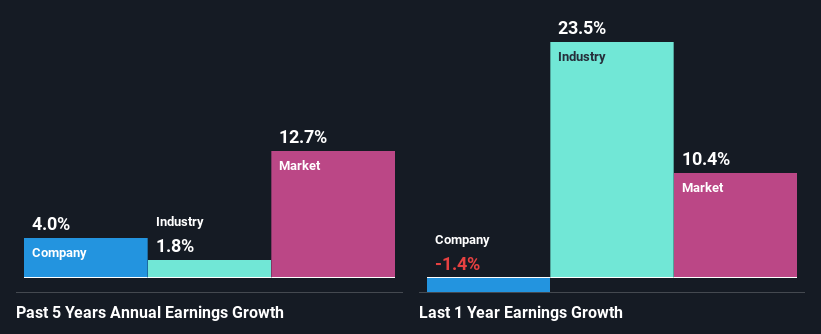Subaru Enterprise Co., Ltd.'s (TSE:9632) Stock Has Been Sliding But Fundamentals Look Strong: Is The Market Wrong?
It is hard to get excited after looking at Subaru Enterprise's (TSE:9632) recent performance, when its stock has declined 14% over the past month. But if you pay close attention, you might gather that its strong financials could mean that the stock could potentially see an increase in value in the long-term, given how markets usually reward companies with good financial health. Particularly, we will be paying attention to Subaru Enterprise's ROE today.
ROE or return on equity is a useful tool to assess how effectively a company can generate returns on the investment it received from its shareholders. Simply put, it is used to assess the profitability of a company in relation to its equity capital.
How To Calculate Return On Equity?
ROE can be calculated by using the formula:
Return on Equity = Net Profit (from continuing operations) ÷ Shareholders' Equity
So, based on the above formula, the ROE for Subaru Enterprise is:
9.1% = JP¥3.2b ÷ JP¥36b (Based on the trailing twelve months to January 2025).
The 'return' is the income the business earned over the last year. Another way to think of that is that for every ¥1 worth of equity, the company was able to earn ¥0.09 in profit.
See our latest analysis for Subaru Enterprise
What Has ROE Got To Do With Earnings Growth?
So far, we've learned that ROE is a measure of a company's profitability. We now need to evaluate how much profit the company reinvests or "retains" for future growth which then gives us an idea about the growth potential of the company. Assuming everything else remains unchanged, the higher the ROE and profit retention, the higher the growth rate of a company compared to companies that don't necessarily bear these characteristics.
Subaru Enterprise's Earnings Growth And 9.1% ROE
At first glance, Subaru Enterprise seems to have a decent ROE. And on comparing with the industry, we found that the the average industry ROE is similar at 8.2%. Subaru Enterprise's decent returns aren't reflected in Subaru Enterprise'smediocre five year net income growth average of 4.0%. So, there could be some other factors at play that could be impacting the company's growth. For instance, the company pays out a huge portion of its earnings as dividends, or is faced with competitive pressures.
As a next step, we compared Subaru Enterprise's net income growth with the industry, and pleasingly, we found that the growth seen by the company is higher than the average industry growth of 1.8%.

Earnings growth is an important metric to consider when valuing a stock. The investor should try to establish if the expected growth or decline in earnings, whichever the case may be, is priced in. Doing so will help them establish if the stock's future looks promising or ominous. Is Subaru Enterprise fairly valued compared to other companies? These 3 valuation measures might help you decide.
Is Subaru Enterprise Using Its Retained Earnings Effectively?
Subaru Enterprise's low three-year median payout ratio of 21% (or a retention ratio of 79%) should mean that the company is retaining most of its earnings to fuel its growth. However, the low earnings growth number doesn't reflect this as high growth usually follows high profit retention. So there could be some other explanation in that regard. For instance, the company's business may be deteriorating.
Moreover, Subaru Enterprise has been paying dividends for at least ten years or more suggesting that management must have perceived that the shareholders prefer dividends over earnings growth.
Summary
On the whole, we feel that Subaru Enterprise's performance has been quite good. In particular, it's great to see that the company is investing heavily into its business and along with a high rate of return, that has resulted in a sizeable growth in its earnings. If the company continues to grow its earnings the way it has, that could have a positive impact on its share price given how earnings per share influence long-term share prices. Remember, the price of a stock is also dependent on the perceived risk. Therefore investors must keep themselves informed about the risks involved before investing in any company. Our risks dashboard will have the 1 risk we have identified for Subaru Enterprise.
Have feedback on this article? Concerned about the content? Get in touch with us directly. Alternatively, email editorial-team (at) simplywallst.com.
This article by Simply Wall St is general in nature. We provide commentary based on historical data and analyst forecasts only using an unbiased methodology and our articles are not intended to be financial advice. It does not constitute a recommendation to buy or sell any stock, and does not take account of your objectives, or your financial situation. We aim to bring you long-term focused analysis driven by fundamental data. Note that our analysis may not factor in the latest price-sensitive company announcements or qualitative material. Simply Wall St has no position in any stocks mentioned.
 Wall Street Journal
Wall Street Journal